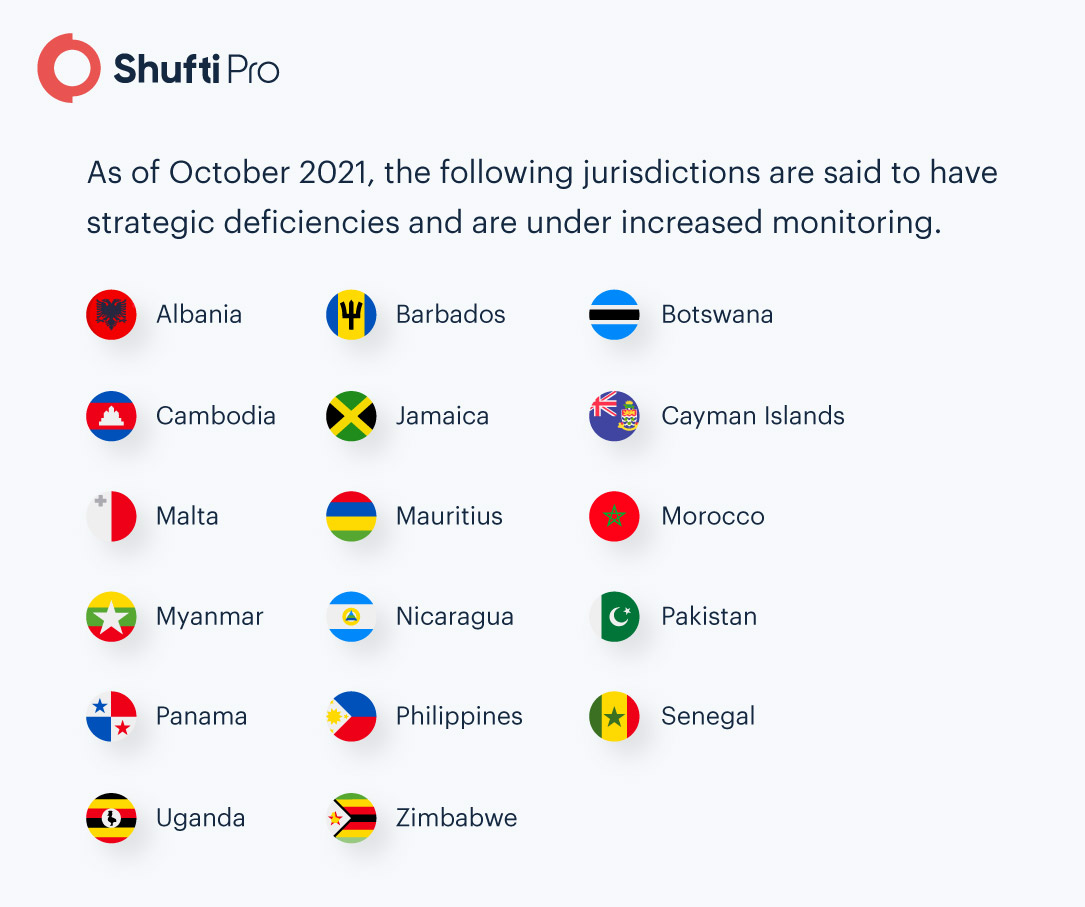10 High-Risk Jurisdictions for Money Laundering According to FATF

Innovations like stablecoins and non-fungible tokens (NFTs) created quite the hype in the past year while bringing about a new variety of security challenges. Countries around the globe are continuously ramping up their AML regulations to combat the latest techniques of money laundering and terrorist financing. Apart from the heavy AML penalties from regulatory bodies, several nations face the risk of being labeled by the FATF (Financial Action Task Force) as a ‘high-risk’ jurisdiction.
2021 FATF Recommendations
The FATF, a global AML standard setter, directs its actions to combat terrorist financing and money laundering in jurisdictions throughout the world. As of now, the number of FATF member countries is increasing as local financial regulators follow FATF’s recommendations. Hence, businesses are also being encouraged to keep an eye out for FATF’s updated AML policies to steer clear of penalties in their respective jurisdictions.
According to the FATF, high-risk jurisdictions are those that have notable strategic deficiencies in their AML compliance measures to combat money laundering, terrorist financing, and proliferation financing. Since these deficiencies lead to an increase in the number of money laundering cases and the consequent fines for the financial institutions involved, the FATF urges its member countries to incorporate enhanced due diligence. EDD assists businesses to carry out detailed background checks of high-risk entities and eliminate financial crime.

1. Albania
Albania is one of the countries that the FATF found to have strategic deficiencies and keeps under increased monitoring. In February 2020, Albania made a high-level political agreement to make joint efforts along with the FATF and MONEYVAL to improve its AML/CFT regime. Since then, Albania has demonstrated efforts to improve its AML/CFT measures by first introducing an electronic invoicing system for business-to-business, business-to-customer, and business-to-government transactions. That being said, Albania is recommended to continue making efforts to address its strategic deficiencies. The FATF recommends establishing a system for registration of real estate properties in Albania, as well as effective mechanisms for preventing criminals from owning or controlling DNFBPs.
2. Jordan
Similarly, Jordan is kept under increasing monitoring by the FATF as it is considered a high-risk jurisdiction when it comes to financial crimes. In October 2021, Jordan agreed to work with the FATF and MENAFATF to improve its AML compliance regime. The FATF has provided an action plan to Jordan, wherein the completion and dissemination of the money laundering/terrorist financing risk assessments of NPOs, legal persons, and virtual assets are required. Furthermore, Jordan is also required to incorporate risk-based supervision and effective, proportionate, and dissuasive sanctions for non-compliance. The global financial watchdog also recommends conducting training and awareness programs for DNFBPs on their AML/CFT obligations, particularly with regard to filing and submitting STRs.
3. Syria
Syria has made progress to sufficiently improve its AML/CFT regime since its agreement with the FATF and MENAFATF in February 2010. Considering the efforts made by the country, the FATF determined in June 2014 that Syria had addressed the suggested action plan by handling terrorist financing with the seizure of terrorist assets. However, due to security reasons, an on-site analysis is pending on part of the FATF. Hence, Syria remains on the list of high-risk jurisdictions and continues to be monitored.
4. Turkey
As part of efforts to improve its AML regime, Turkey has established a national strategy for those in charge of preventing ML and TF, as well as developing a beneficial ownership registry. The country is said to follow the FATF action plan by dedicating more officials for the supervision of AML/CFT compliance and raising the number of on-site inspections. Turkey is urged by the FATF to implement the risk-based approach in order to comply with the FATF’s recommendations.
5. The Cayman Islands
The Cayman Islands is another country identified by the FATF to have a weak AML system. The country made an agreement in February 2021 to work along with the FATF and CFATF to improve its efforts to combat financial crimes. The measures required to adhere to FATF’s recommendations include imposing sanctions against relevant parties that fail to submit accurate and up-to-date beneficial ownership information. Moreover, the country must demonstrate that they are prosecuting money launderers and imposing necessary sanctions.
6. Jamaica
Just like the Cayman Islands, Jamaica also made an agreement in February 2020, where the country committed to strengthening efforts against money laundering and terrorist financing. FATF recommends Jamaica to address its strategic deficiencies by “including all FIs and DNFBPs in the AML/CFT regime and ensuring adequate, risk-based supervision in all sectors”, and “including all FIs and DNFBPs in the AML/CFT regime and ensuring adequate, risk-based supervision in all sectors”.
7. Barbados
Apart from being labeled as a high-risk jurisdiction by the FATF, Barbados is also categorized as a country of primary concern in respect to ML/TF by the US State Department. However, the country has demonstrated efforts to improve its status “by applying risk-based supervision and sanctions on FIs and TCSPs”. The FATF recommends that the country should take further steps including “taking appropriate measures to prevent legal persons and arrangements from being misused for criminal purposes and ensuring that accurate and up-to-date basic and beneficial ownership information is available on a timely basis”.
8. Malta
Malta was repeatedly seen in the news for heavy fines due to money laundering in the past year. A 200% spike in money laundering cases was seen in the first half of 2021. The reason was said to be the breach of AML regulations by local businesses. The FATF recommends the country to improve efforts to “demonstrate that beneficial ownership information is accurate and that, where appropriate, effective, proportionate, and dissuasive sanctions, commensurate with the ML/TF risks, are applied to legal persons if the information provided is found to be accurate”.
9. Morocco
In March 2021, the FATF put Morocco on the grey list for pervasive money laundering and terrorist financing. The FATF president said, “Among other things, Morocco must strengthen its financial intelligence unit, one of the core authorities in the fight against money laundering.” The Minister of Justice insisted on “the urgency of passing a new law, which concerns the creation of a national financial intelligence institution as well as the establishment of a legal mechanism for the application of sanctions decreed by the United Nations Security Council in matters of financial crimes, money laundering, and terrorist financing.” As a result, the country is recommended to monitor and effectively supervise the compliance of FIs and DNFBPs with financial obligations.
10. Mali
Mali has been making considerable efforts to improve its AML system and be removed from the FATF’s list of high-risk jurisdictions. The country adopted its National Risk Assessment (NRA) and ramp up the efforts against money laundering by raising awareness starting from the highest-risk sectors. Local financial regulators in Mali are working to ensure that the relevant authorities undergo prosecution and investigation for money laundering.
Key Takeaways
When situations get even more serious than ‘high-risk’, the FATF calls for counter-measures to prevent the risks of crimes like money laundering affecting the international financial system. Shufti’s AML Screening enables businesses in the financial sector to perform accurate background checks of their customers and prevent getting involved in money laundering or terrorist financing.
Want to learn more about our AML screening solution for your business?

 Explore Now
Explore Now













